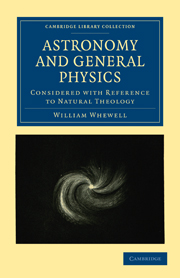Book contents
- Frontmatter
- NOTICE
- Contents
- INTRODUCTION
- BOOK I TERRESTRIAL ADAPTATIONS
- BOOK II COSMICAL ARRANGEMENTS
- CHAP. I The Structure of the Solar System
- CHAP. II The Circular Orbits of the Planets round the Sun
- CHAP. III The Stability of the Solar System
- CHAP. IV The Sun in the Centre
- CHAP. V The Satellites
- CHAP. VI The Stability of the Ocean
- CHAP. VII The Nebular Hypothesis
- CHAP. VIII The Existence of a Resisting Medium in the Solar System
- CHAP. IX Mechanical Laws
- CHAP. X The Law of Gravitation
- CHAP. XI The Laws of Motion
- CHAP. XII Friction
- BOOK III RELIGIOUS VIEWS
CHAP. VII - The Nebular Hypothesis
from BOOK II - COSMICAL ARRANGEMENTS
Published online by Cambridge University Press: 05 August 2011
- Frontmatter
- NOTICE
- Contents
- INTRODUCTION
- BOOK I TERRESTRIAL ADAPTATIONS
- BOOK II COSMICAL ARRANGEMENTS
- CHAP. I The Structure of the Solar System
- CHAP. II The Circular Orbits of the Planets round the Sun
- CHAP. III The Stability of the Solar System
- CHAP. IV The Sun in the Centre
- CHAP. V The Satellites
- CHAP. VI The Stability of the Ocean
- CHAP. VII The Nebular Hypothesis
- CHAP. VIII The Existence of a Resisting Medium in the Solar System
- CHAP. IX Mechanical Laws
- CHAP. X The Law of Gravitation
- CHAP. XI The Laws of Motion
- CHAP. XII Friction
- BOOK III RELIGIOUS VIEWS
Summary
We have referred to Laplace, as a profound mathematician, who has strongly expressed the opinion, that the arrangement by which the stability of the solar system is secured is not the result of chance; that “a primitive cause has directed the planetary motions.” This author, however, having arrived, as we have done, at this conviction, does not draw from it the conclusion which has appeared to us so irresistible, that “the admirable arrangement of the solar system cannot but be the work of an intelligent and most powerful being.” He quotes these expressions, which are those of Newton, and points at them as instances where that great philosopher had deviated from the method of true philosophy. He himself proposes an hypothesis concerning the nature of the primitive cause of which he conceives the existence to be thus probable: and this hypothesis, on account of the facts which it attempts to combine, the view of the universe which it presents, and the eminence of the person by whom it is propounded, deserves our notice.
1. Laplace conjectures that in the original condition of the solar system, the sun revolved upon his axis, surrounded by an atmosphere which, in virtue of an excessive heat, extended far beyond the orbits of all the planets, the planets as yet having no existence.
- Type
- Chapter
- Information
- Publisher: Cambridge University PressPrint publication year: 2009First published in: 1833



